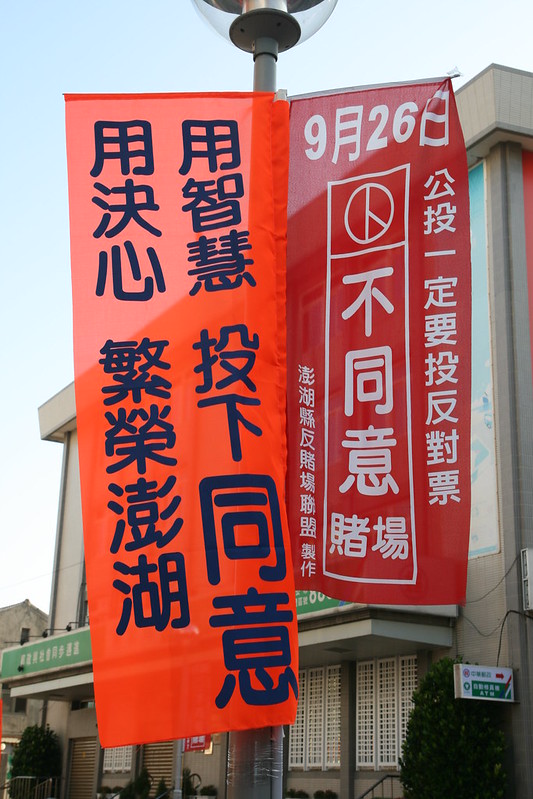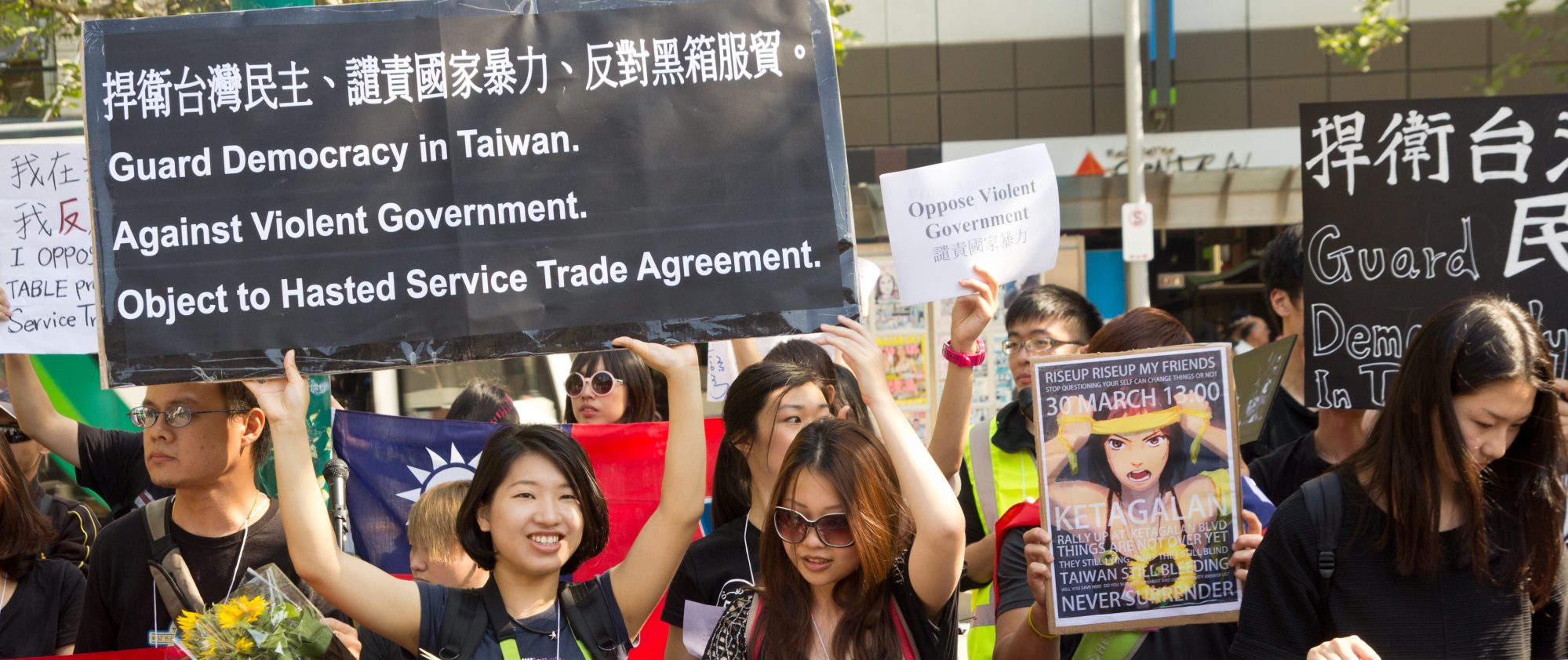
For the past week I have been involved in various activities of the Anti-gambling Alliance (反賭博合法化聯盟) in their campaign against the plan for a casino on Penghu (澎湖). The residents of Penghu will vote in a referendum on 26 September that will decide whether plans for the casino will be approved. If the referendum passes and a casino is built it will be Taiwan’s first casino. At present the lottery is the only form of legalised gambling in Taiwan.
On Tuesday 19 September there was an international press conference in Taipei. Representatives of various NGOs including the Life Conservation Association, Green Party, Citizen Congress Watch and Taiwan Environmental Protection Union all spoke out against the plan for a casino and the referendum. They also mentioned that the referendum was illegal and unconstitutional as there was no minimum threshold for the referendum to pass. This is in contrast to national referendums where the threshold is set at a very high level.
Dr Tim Kelly who was the executive director of the US Congressional National Gambling Impact Study Commission (NGISC) was specially invited to Taiwan to share his experience. The NGISC report is the most comprehensive and authoritative report economic and social costs and benefits of legalized gambling anywhere in the world. A key point that Dr Kelly emphasised was the need for a comprehensive analysis of the costs and benefits of a casino on Taiwan before any casino is built in Taiwan. A summary of Dr Kelly’s key points on how the report applies to Taiwan can be found here.
The press conference received good media coverage. Check the report in the Taipei Times and Max Hirsch’s excellent article published on Gambling Compliance. Video news reports are available from FTV News and PeoPo.org.

After the press conference I travelled to Penghu with Dr Kelly and Professor Yeh Chih-kuei. After landing at the Magong Airport we were met by Mr and Mrs Lin who are two of the most active campaigners against the casino on Penghu. They drove us to Houliao to visit one of the proposed sites for the casino.
The site is located at the end of a narrow road and the only nearby infrastructure is a small visitor’s centre and ferry port. Dr Kelly said he thought the site was unsuitable for an international casino as it was completely lacking in infrastructure and also a barren and unattractive area.
I only spent a short time on Penghu and only had time to get a brief overview of the islands. A major question that was raised in my mind was if Penghu has failed to develop as a major international tourist attraction up to now, then how would a casino suddenly facilitate this development. Why would people choose to come to Penghu instead of already established casinos in Macau or Korea? Furthermore Penghu’s environment is fragile and it already suffers from water shortages. How could it cope with a significant increase in tourist arrivals? The supporting infrastructure required for a major resort casino would cause enormous harm to the environment.

Around Magong and other places on Penghu the for and against campaigns had both put up banners to encourage people to vote in the referendum. The red banners are for the “disagree” vote, while the orange are for the “agree” vote. While the red banners include the name of the Penghu Anti-casino Alliance (澎湖縣反賭場聯盟), the red banners give no indication as to who was responsible for them.

The visit to Penghu was timed to coincide with the public hearing. This hearing was required as part of the referendum. Despite the name it wasn’t open to the public. Instead it was broadcast on television. Whether this is a good or bad thing is debatable. Professor Yeh, who was one of the speakers for the against side, said that in past public meetings he had been shouted down and a disproportionate amount of time was given to proponents of the casino. The public hearing this time allocated three speakers from each side ten minutes each to make their case. (If you search for “澎湖地方性公民投票案” on YouTube you can watch the speeches of all six people).
Some other issues of concern raised during the time on Penghu were the local media’s coverage of the casino issue. Both of Penghu’s newspapers have given a large amount of coverage to arguments in favor of the casino while arguments against have been ignored. The Anti-gambling Alliance had also been denied a permit to hold a rally on the eve of the referendum.

On Thursday 17 September a group from the Anti-gambling Alliance visited the President of the Control Yuan Wang Chien-shien (王建煊). The picture above shows Ven. Chao Hwei (昭慧法師) presenting a letter to the Control Yuan President.
After Dr Kelly and members of the Anti-gambling Alliance expressed their opinion, Wang Chien-shien spoke. He began by saying that the Control Yuan lacked the power to respond to the requests. He then offered his personal opinion on the matter. He is strongly opposed to gambling and he made this very clear while a large contingent of media was present. He said that if Penghu develops a casino it will be a “disaster” and the people of Penghu will come to regret it.
The Taipei Times has an article on the Control Yuan President’s opposition to the casino. A video news report of the Control Yuan meeting is on YouTube.
There are many lessons to be learned about the nature of democracy in Taiwan from the ongoing campaign against the casino. At the 15 September press conference a Japanese reporter asked a very good question. He said if the referendum passes will the Anti-gambling Alliance accept the decision of the citizens of Penghu. Ho Tsung-hsun (何宗勳), director of Citizen’s Congress Watch, replied that in a democracy it is important that people have access to all the information to make their decision. The citizens of Penghu have only been informed of the benefits of a casino but not the costs.
Dr Kelly likened the campaign to the battle between David and Goliath. On one side stands the government and corporations with a huge amount of resources. While on the other side there is a small group of people with limited resources but a great deal of dedication and energy. The result of the referendum will be known next weekend. While the odds might be stacked against those campaigning against the casino they have still not given up, a chance of victory still remains.
